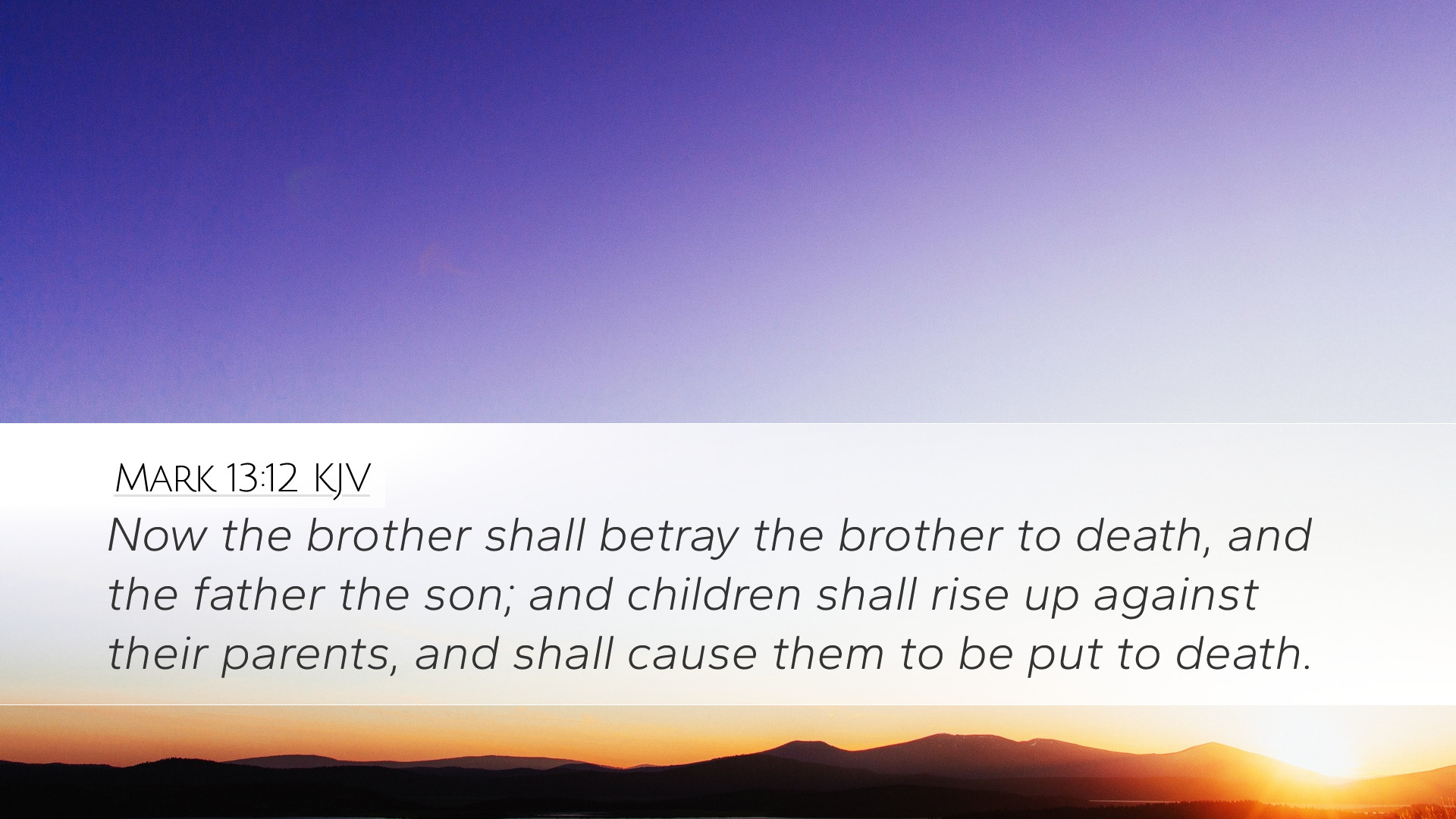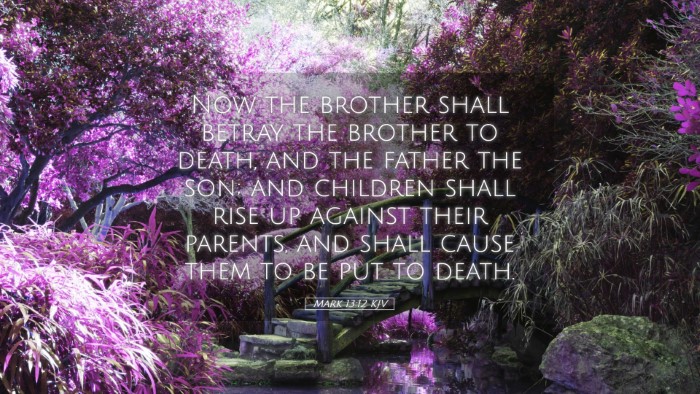Commentary on Mark 13:12
Verse Overview: Mark 13:12 states, “And the brother shall betray the brother to death, and the father the son; and children shall rise up against their parents, and shall cause them to be put to death.” This verse presents a somber prediction about familial discord and persecution during the times of tribulation.
Historical Context
In this passage, Jesus speaks about events that would unfold during the last days, particularly focusing on the intense persecution that His followers would face. This prediction serves not only as a commentary on the immediate historical context—a time of great upheaval in the Jewish world leading up to and including the destruction of Jerusalem in 70 AD—but also extends to the broader implications of division within families, a theme found throughout the Gospels.
Insights from Matthew Henry
Matthew Henry comments that this verse displays the totality of the conflict that Christianity would evoke, even among the strongest familial bonds. He notes that the animosity that arises from religious conviction can penetrate deeply into personal relationships. Henry explains, “It may not seem strange that the enemies of Christ should rise against His witnesses, but for men to rise up against those of their own family, and even those of their own house, that is a matter of great lamentation.”
He further emphasizes the spiritual warfare aspect, implying that the root of such betrayal lies in the heart of man—a heart alienated from God by sin. The division within families can be understood as evidence of the overarching conflict between darkness and light within society.
Insights from Albert Barnes
Albert Barnes elaborates on the phrase “brother shall betray the brother”: It suggests that loyalty, which should be the hallmark of familial relationships, can be utterly compromised under pressure. Barnes observes, “Such is the influence of strong religious opinions that they may induce even those most closely related to act contrary to all their natural feelings.”
He highlights that this prophecy warns believers that they would experience hostility from their own family members—a realistic portrayal of the trials faced by the early church. Barnes asserts that while this discord might cause deep pain, it serves to draw the true believers closer together in Christ, sharing their burdens and prayers as a new family in faith.
Insights from Adam Clarke
Adam Clarke focuses on the severity of the consequences described in this verse. He points out that the betrayal might lead to death, reflecting the tragic turn of events that often accompanied the spread of the Gospel. Clarke writes, “All the favors of the world, of relationship, education, or personal affection must be sacrificed to follow Christ effectively.”
Additionally, Clarke explores the idea of children rising against their parents as indicative of a complete overturning of social norms. This represents not just a familial breakdown but a societal one, showcasing the radical changes that the advent of the Gospel would bring to established traditions and loyalties.
Theological Implications
This verse introduces significant theological themes concerning the cost of discipleship. Jesus invites followers to count the cost of their commitment to Him and His message. The strife within families points toward the radical transformation that occurs in the hearts of believers—a transformation that can lead to opposition from those who do not share the same faith.
Additionally, the concept of betrayal offers profound insights into the nature of sin and human relationships. Jesus acknowledges the fragility of human ties in contrast to the enduring bond found in spiritual unity within the body of Christ. This verse profoundly impacts pastoral counseling, especially during moments when believers face opposition or betrayal, reminding them of Christ’s foreknowledge and abiding presence during such trials.
Application and Reflection
Pastors, theologians, and students of Scripture are challenged to reflect on the relevance of Mark 13:12 in contemporary society. The division among families due to differing beliefs remains a potent issue in many contexts, and this passage serves as a reminder of the implications of faith on personal relationships.
The insight from Mark 13:12 calls for a deepened understanding of God's sovereignty amidst conflict. Believers today can find hope and strength in the promise of Christ, who aligns Himself with those who endure hardships for His sake.
Furthermore, this commentary necessitates an introspective approach for families regarding how faith is discussed and lived out within the home, ensuring that love and respect prevail even in disagreement.
Conclusion
Mark 13:12 serves as a stark reminder of the realities of discipleship and the potential ramifications of following Christ. The greatest loyalty must be to God, which can lead to misunderstanding, betrayal, and conflict even among the closest relationships. However, understanding this dynamic encourages believers to support one another, fostering a sense of community rooted in the love of Christ, which transcends the conflicts of this world.


